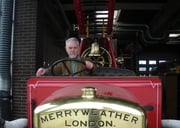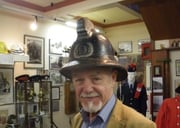Seventy years ago, Germany unleashed a hail of terror on Belfast.
On Easter Tuesday, April 15, 1941, hundreds of Luftwaffe bombers began what became known as the Belfast Blitz.
Ireland remained neutral during World War II but Taoiseach Eamonn De Valera decided to send firemen to help the stricken city. Volunteer crews travelled from Dublin, Dun Laoghaire, Drogheda and Dundalk. They found much of the city devastated after the four-hour bombing raid. Reporter Paddy O’Flaherty discovered a few surprises as he researched the story. It was already part of his family history. His maternal grandfather, Patrick Rooney, drove the Dundalk fire engine that arrived first in Belfast. But the full story has never been told.
The record books held by the Dublin Fire Brigade Museum make no mention of the fact that the city’s firemen made a life-saving dash to Belfast. The event was not officially recorded, partly because of fear of repercussions from Germany. There were also concerns about the question of responsibility in the event of a southern fireman being killed or seriously injured. O’Flaherty was also surprised to find there is no official list of the names of all the firemen who travelled north. They became the hidden heroes.
The request for help was made by the Stormont Minister for Public Security, John McDermott, who later became Lord Chief Justice of Northern Ireland. As flames engulfed large parts of Belfast he asked Deputy Prime Minister Basil Brooke for permission to request assistance from Dublin. Brooke agreed and the message reached De Valera, possibly via the railway telegraph because telephone lines had been destroyed.
About 200 tons of bombs were dropped on the city which was largely unprotected. Before Germany invaded France it was thought that Belfast was beyond the range of the Luftwaffe. It became an easy target for aeroplanes leaving from the Brest Peninsula in north-western France.
Nearly a thousand people were killed in the Blitz. Outside London, this was the greatest loss of life in a single night air raid during the war. About 100,000 people were left homeless.
The main targets were the Harland & Wolff shipyard, the Short Brothers aircraft factory and James Mackie’s engineering factory.
The city had few air raid shelters. Some people, Catholics and Protestants, took refuge in the crypt at the Redemptorist Monastery at Clonard in West Belfast. O’Flaherty visits the crypt and sees the event recorded in the monastery diary.
Among the blitz survivors he meets 91-year-old Rita Brown. She was at a concert in the Ulster Hall in the centre of Belfast when the blitz began. The star was the Connemara singer Delia Murphy. As the air raid warning sounded some people fled but most remained in the hall.
Delia continued to sing as the bombing started – and she went on singing until the raid ended. Rita says Delia calmed the crowd and undoubtedly saved lives by persuading people not to leave the hall, which escaped the bombs. As she walked home, Rita, like the firemen, was appalled by the horrific scenes of destruction.
Produced by Paddy O’Flaherty

